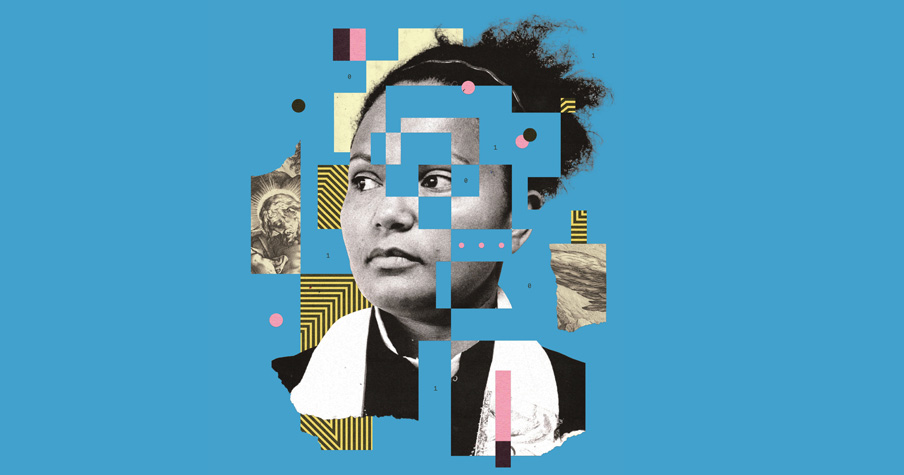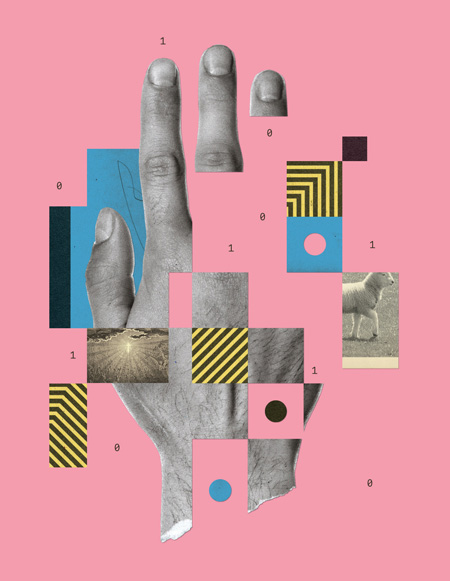
llustrations by Blake Cale
Artificial intelligence is found throughout society, and due to recent apps and websites like ChatGPT and Gemini, it’s now more accessible than ever. The concern among educators – as it is in other fields – is what AI will do to the field, not just in ways that students may be educated but also how it will affect the underlying field. For theological educators, the concerns go deeper into ethics, theology, and what it means to be human.
In an interview on the In Trust Center’s “Good Governance” podcast, Acadia Divinity College President Rev. Anna Robbins, Ph.D., discusses her school’s experiment with AI. A theologian and futurist, Robbins considers how the field might engage AI and the future. This is an edited version of the conversation. The full podcast, Episode 84, can be found at: intrust.org/podcast.
A historic moment
People have to recognize that this is not just another cultural trend. The emergence of AI – which is not new, it’s just accessible in new ways at the moment – is likely to have as big an effect, if not bigger, than the development of the printing press on Western culture and the culture of the world. Recognize that this isn’t just another trend and the power that it has. How we respond to that as theologians, as leaders in the church, is really important.
I get frustrated sometimes when people say, “Well, it is just another thing.” It’s not really just another thing. This is a really, really big thing. Although that seems overwhelming sometimes and scary sometimes, I don’t know that we have a pass as Christian leaders on the scary and big things. In fact, we probably have a call to meet them head on. The “Chicken Little” people – the sky is falling, this is terrible – and the people who are head in the sand, I think both of them are motivated by fear. So we’ll pretend it’s a small thing and doesn’t need our attention, or we will run far away because it’s just too scary. I don’t know about everyone else, but I like to think I’m friends with the God of the universe, so I don’t need to be afraid. And I’m not afraid.
We’re going to have more need of this than ever in a world where we’re going to have to be wrestling with what does it mean to be human?
Engaging vs. embracing AI
I think the call to us has always been to engage what’s happening in the world, what’s happening in culture, not to embrace it. That’s not what I would ever say. And I’ve had some people actually say, “You guys are embracing all that AI. Are you sure that’s a good thing?” We’re not embracing it. We’re engaging with it and we’re keen to experiment to find out what it can do, what is the extent of what it can do for us as theological educators for the Church so that we might be able to harness it for good and to also be able to assess what things about it are not so good.
You can’t assess those things if you don’t actually understand what it’s capable of. That’s why we have that frame of saying, “We’re going to engage; we’re going to explore.”
I think that’s really an adaptive posture for a leader to say, “Well, why should we be afraid of it?” We carry who we are into this, and the way that we approach futuring here is to say, “If we’re involved in this earlier on in its emergence and its impact on contemporary culture, we actually might have some kind of influence on the direction that it would take.” Whereas, if you just don’t engage at all, you won’t have that influence.
Sometimes people say, “Well, I’m going to wait. I’ll let the early adopters get in. We’ll let them learn the lessons and then decide what we’re going to do.”
Futurists are saying that this is unlike many other technologies. It could be that if you don’t engage and understand now, the gap is going to be huge and you won’t be able to catch up.
A relational moment
Some people are panicking saying, “Oh, you people experimenting with AI. ... You just want to see all the faculty sacked so you can save money as a school.” There are experiments we’ve done here that have led us to realize that one person could run the seminary off the side of their desk with a handful of avatars and manage, in notion if not in fact, accredited learning without a faculty altogether. That’s not our goal because we don’t think that’s what theological education is about. That’s knowledge transfer. You don’t need the seminary simply for knowledge transfer. We’re ahead of the game experimenting with this. We’re adding faculty. We’re not subtracting faculty because we believe that the future of the seminary is absolutely relational. It doesn’t mean that you have to be face-to-face in person. I say everyone’s in person, whether they’re online or on-site. Increasingly, that’s the case. But they do want the relationality and the connection. That’s something we’ve learned from an experiment. We did a term with an AI-generated course, for example. It helps us to see both ways that AI can help us to do our work with efficiency, to release us for some of the other things that maybe God’s calling us to, beyond the infinite task of marking, for example, and devising syllabi and all of those things that faculty “love.”
But that’s not what brought them into the game. What brought them into the game is a curiosity and a faith seeking understanding, seeking God’s thoughts after Him. And those kinds of things are what formed universities to begin with, and why I think theological faculties still exist.
Seminaries are places where you come to grow, and it’s organic. It has to be relational, and there has to be time spent together in ways that nurture the formation and the spirit. We’re going to have actually more need of this than ever in a world where we’re going to have to be wrestling with what does it mean to be human? In a world where AI seems to do so many human things, things that we thought were uniquely human are no longer. So, what does it actually mean to be human? For the church, what does it mean to be a human who relates to God? That still is hardly exhausted at all by the death of the knowledge industry because we don’t pedal in knowledge of God objectively so much as lead people into relationship, deeper relationship, with the God they serve, and to serve God’s people better because of the relationship they have with God.

A need for humility
One of the things I think a lot about is how we need to approach this with a sense of humility. I think for a long time, people in theological schools –and in higher education generally – we’re the people who have arrived. We’ve learned so much stuff, and we’ve got Ph.D.s ,and aren’t we the smartest people? And I think when we recognize that the world has changed so much that maybe it’s a different kind of knowledge needed. That can either come to us as a threat or as an invitation.
I think that in theological education, we’re prepared for the invitation, but we have to be able to be humble enough to recognize that, “OK, was my Ph.D. on the wall ever really what I was called into this for?” Now, it can be used in a way that helps guide, I would suppose, in some ways, our interaction with AI, with wisdom rather than knowledge. And so developing a humble wisdom as we approach all of this, I think is really key. And recognizing – I mean, I’m convinced – that there’s nowhere in the world that the spirit of God can’t be and isn’t. So finding how the Holy Spirit is leading us in this is a great adventure. And, if there’s any way that we can use the emergence of AI and its potential in a positive way to serve the Church and people coming to know God better and more Christ-like in our context, then I’m all for it.
But I think we have to be humble and reliant and listening and theologically reflective all the time. Because I have had people say to me, “Are you just jumping in? What about the ethics? You need to take time for the ethics.” Well, we’re reflection and action, but the reflection piece is crucial to not just embrace it because it’s exciting, but to be thoughtful about who gains from this and who pays, and what’s this going to cost humanity in the end. And to recognize the environmental costs and some of those things that are not just, but we also can’t stop it. The genie is out of the bottle and the toothpaste has been squeezed. You can’t get it back in the tube. So, “What are we going to do with it?” is the challenge, and the invitation is the opportunity.